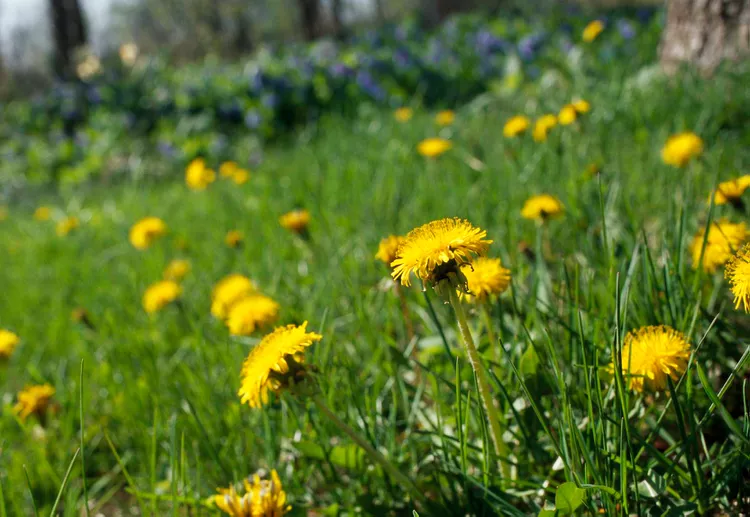Are Dandelions That Bad for Your Lawn?

Are dandelions bad? Not really! Dandelions were intentionally brought to North America by European settlers in the 17th century. Some say it was for medicinal purposes or as a food crop, but it could have been because they reminded the newcomers of their homelands. For whatever reason, it was a conscious decision. Even the name points to its European roots, which comes from the French term “dent de lion,” meaning “tooth of the lion,” and refers to the species’ deeply toothed leaf edges.
Benefits of Dandelions
With cottony seeds that travel far distances on the wind, this herbaceous perennial soon escaped cultivation and became something resembling a pest to people who didn't know what they were. Dandelions are kind of like that misunderstood friend you have. Someone says something negative about them, and you feel compelled to reply with a “yeah, but...” response. So if you ask the question, “Are dandelions bad?” The answer is, “Yeah, but they can be beneficial too.” Here’s how.
1. They’re Pretty
Those yellow flowers are a delightful treat after a gray and dull winter. If you’ve ever seen a dandelion lawn in full bloom, you know it’s a cheery sight. Yeah, it looks a bit messy a few weeks later when it goes to seed, but that just means more of those bright blooms will show up later.
2. They’re Fun
C’mon, what kid didn’t like mashing the yellow flowers into someone’s face to leave a yellow stain on their cheek? Or blowing the fluffy seed heads into the air to make a wish? (Nature is devious in effectively dispersing seeds, even stooping to kids’ games.)
3. They’re Edible
Dandelion leaves add a bitter, peppery flavor to salads and soups. The bitterness takes a little getting used to, so you might think about adding dandelions in small amounts to your salad. You can also cook the greens to make them less bitter. In any event, always harvest juvenile plants, which are less bitter. Of course, you don’t want to harvest dandelions from lawns treated with herbicides or pesticides.
4. They’re Healthy
Adding dandelion greens to your diet can have several health benefits because they’re low in calories and loaded with vitamins and nutrients. Two of those nutrients, lutein and zeaxanthin, play a role in healthy eyesight. Dandelion greens also contain Vitamin A, which is essential to vision and supports the growth of new blood cells, and Vitamin K, which regulates the formation of blood clots and maintains healthy bones. Dandelion greens also provide Vitamin C and calcium.
5. They’re Ecological
Small birds eat the seeds, and several pollinators get nectar from the flowers. Allowed to develop fully, taproots can penetrate hardpan, a layer of compacted soil, to extract calcium from the subsoil. (Fun fact: dandelion roots can grow 10 to 15 feet into the ground!) In addition, dandelions are among the first weeds to colonize disturbed land. That may sound bad, but remember; nature abhors bare ground. So-called weeds fight erosion.
6. They Make a Good Wine
It’s made by fermenting dandelion tea with yeast, sugar, and citrus. You only use the petals of the flower head and only from those plants that flower early in the season for the best flavor.
Ways to Use Dandelion Greens
Do you like sneaking vegetables into meals whenever possible? Try making hearty soups and stews: you can easily slip in nutritious vegetables. Dandelion greens are no different. Cut up the leaves and add them to other salad greens. Toss them in a sandwich or omelet. They also work well in pasta dishes.
How to Grow Dandelions
You’re kidding, right? They’re indestructible. They don’t need any help! True, which is why you need to keep them from becoming a nuisance. If you want to grow them to eat, plant them in big containers in full sun. Regularly clip the flower stems so they can’t go to seed. And harvest leaves when they’re still small, so they’re more tender and less bitter. Finally, although they don’t need fertilizer, you could give them a shot of water-soluble plant food once a month to encourage more leaf growth.
Deciding to keep dandelions in your landscape can be a controversial decision. Still, these plucky little plants can benefit you and your yard. Whether you use dandelions to feed wildlife and fight erosion or you love to add them to your salad, there are plenty of dandelions to go around. So pause a moment before you destroy them. They have a variety of ecological uses, and their nutrients can even benefit your health.